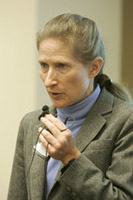Nov 23 2008
College students and U.S. Fish and Wildlife Service professionals are learning together this semester in a course on conservation and global climate change at Indiana University Bloomington.
 Vicky Meretsky, Indiana University School of Public and Environmental Affairs
Vicky Meretsky, Indiana University School of Public and Environmental Affairs
And, through the use of innovative technology, they are doing so in a way that doesn’t contribute to climate change. The IU School of Public and Environmental Affairs course meets on campus, but dozens of Fish and Wildlife Service personnel from eight states participate from their homes or offices, linked to the classroom by a high-quality telephone connection and desktop sharing computer software.
The result: high-quality professional development for Fish and Wildlife Service employees, at little cost and with a small carbon footprint – no travel to central training site and little time away from work.
“This approach is ready for prime time; we just seem to be the first people using it in a widely leveraged environment,” said IU Associate Professor Vicky Meretsky, who teaches the class with Professor J.C. Randolph.
Thirty-six IU students, most of them graduate students, attend the weekly class in a distance-learning classroom. A comparable number of staff from the Fish & Wildlife Service Midwest Region – Indiana, Illinois, Iowa, Michigan, Minnesota, Missouri, Ohio and Wisconsin – dial in and log on for every class. Dozens more USFWS employees join in when the lecture topic interests them or relates to their work.
Meretsky lined up the weekly lecturers, including professors at eight universities and officials from such organizations as the World Wildlife Fund and the National Wildlife Federation.
They use PowerPoint slides that are viewed on screens in the IU classroom and, simultaneously, on the computers of Fish and Wildlife Service participants. A “chat” function with the software allows viewers at remote locations to ask questions during the lectures. They can also speak via a dedicated telephone line, which is paid for by the Fish and Wildlife Service.
“Vicky has brought together all of the experts, the top people in their fields, and they’re giving us presentations on their research. How can you ask for anything more than that?” said Tom Simon, a fish and wildlife biologist with the Fish and Wildlife Service office in Bloomington.
Simon said learning about climate change is essential for the Fish and Wildlife Service, which is responsible for protecting endangered species and managing refuges and other special areas, many of which are vulnerable to rising sea levels, hotter and dryer summers and other anticipated effects of climate change.
Dan Ashe, Science Adviser to USFWS Director H. Dale Hall, said the class also helps the agency experiment with a new approach to delivering training and to start preparing for the workforce of the future, which will expect more intensive use of distance-learning technology.
“If we’re going to meet the challenge of climate change and reduce our carbon footprint as an organization, it’s critical that the Service increasingly consider and start using these technologies,” Ashe said. “It’s an important part of breaking new ground for us, and we appreciate Indiana University’s support.”
IU students benefit from learning to use the technology and from extensive classroom contact with Fish and Wildlife Service professionals, Meretsky said. IU faculty members plan to produce an article about the class experience and have given poster presentations about it at national conferences. The Fish and Wildlife Service has offered to provide comments on final papers that IU students produce for the class, and possibly to consider them to inclusion in a peer-reviewed agency publication.